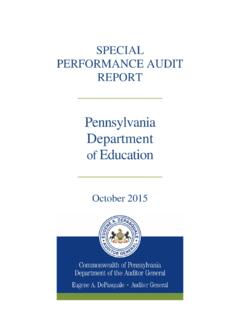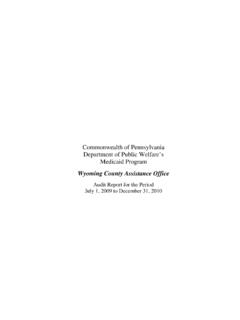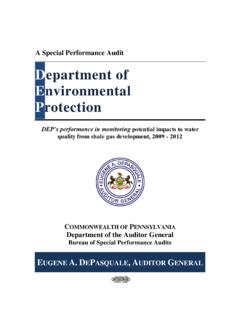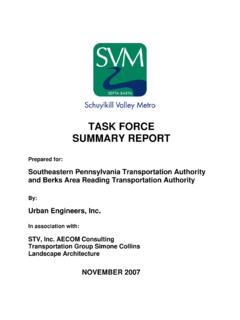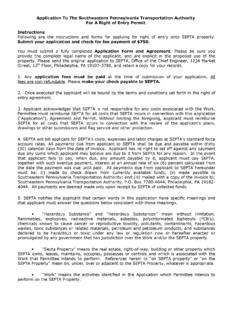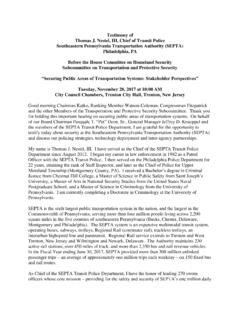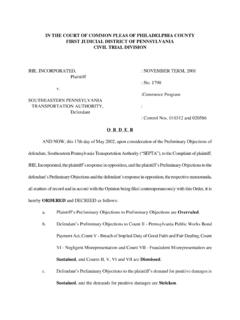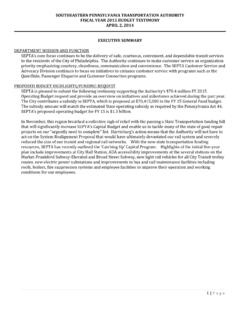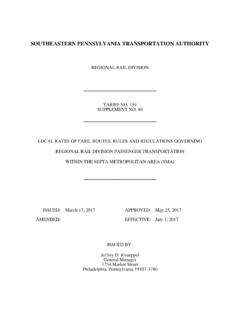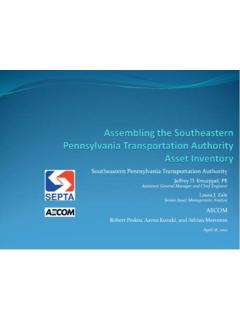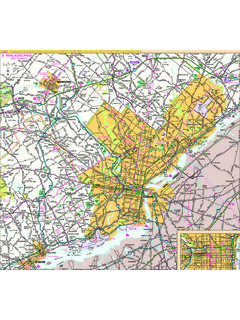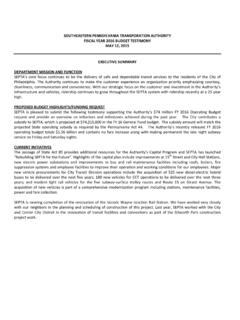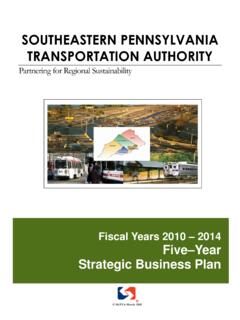Transcription of Performance Audit: - Southeastern Pennsylvania ...
1 Performance audit : Southeastern Pennsylvania transportation authority August 2012 August 17, 2012 Mr. Pasquale T. Deon, Sr. Chairman Southeastern Pennsylvania transportation authority 1234 Market Street Philadelphia, Pennsylvania 19107 Dear Mr. Deon: Enclosed is our Performance audit of the Southeastern Pennsylvania transportation authority (SEPTA) for the period from July 1, 2006, through June 30, 2009, with updated information through August 3, 2012, as noted in the report. We conducted the audit in accordance with generally accepted government auditing standards as issued by the Comptroller General of the United States. Our report presents six findings and seven recommendations.
2 The most significant finding, which discussed swap agreements, is detailed in Finding One. We determined that SEPTA s use of interest rate swaps associated with its 1999 Series A and Series B bonds cost the taxpayers and SEPTA s fare-paying customers over $ million more than if SEPTA had not entered into swaps agreements. It is our position that swap deals are inherently unsuitable for public finance because there is a multitude of hidden risks associated with swap deals. The use of swaps by government agencies essentially amounts to gambling with public money. We are recommending that SEPTA terminate all remaining swaps as soon as it is fiscally responsible to do so and SEPTA should prohibit the use of swaps in the future.
3 Three of our findings address management salaries and benefits. In Finding Two, we noted that salaries paid to top management were competitive with, or lower than, those paid to top management at other transit agencies similar in size and complexity to SEPTA. In Finding Three, we compared the benefits provided to SEPTA s top management with the benefits provided to top management at similarly sized transit agencies and found that, while competitive, SEPTA could achieve cost savings by making some modifications to its benefits package. In Finding Four, we compared the benefits provided to both union and management employees and found that the differences were not significant between the two groups of employees. Mr.
4 Pasquale T. Deon, Sr., Chairman Southeastern Pennsylvania transportation authority August 17, 2012 Page 2 Our audit work related to contracts is presented in Finding Five. We found that SEPTA complied with policies and procedures with regards to procurement and monitoring. However, we noted that SEPTA did not exercise prudence with regard to its expenses for the annual safety banquet and for catering meals at board meetings. Finally, our examination of outside funding sources is presented in Finding Six. We found that SEPTA effectively monitored its primary outside advertising revenue and took steps to maximize that revenue. These findings are discussed in detail in the enclosed report. Sincerely, JACK WAGNER Auditor General A Performance audit of the Page i Southeastern Pennsylvania transportation authority (SEPTA) Table of Contents Pennsylvania Department of the Auditor General Jack Wagner, Auditor General August 2012 Table of Contents Introduction and Background.
5 1 Objectives, Scope, and Methodology .. 9 audit Results .. 11 Finding One - SEPTA s use of interest rate swaps associated with its issuance in 1999 of $262 million of 1999 Series A and Series B Bonds cost the taxpayers and SEPTA s fare-paying customers over $ million more than if SEPTA had financed at that time with conventional fixed rate bonds.. 14 Finding Two - SEPTA paid its top management salaries that were competitive with the salaries paid to top management at transit agencies similar in size and scope to SEPTA .. 25 Finding Three - SEPTA provided its top management with benefits that were comparable to those at transit agencies similar in size and complexity; for other benefits, SEPTA could have achieved savings to help control its operating costs.
6 29 Finding Four - SEPTA provided more generous benefits to its management employees in some cases, and more generous benefits to its union-represented employees in other cases. The differences were not excessive by comparison.. 32 Finding Five - Even though it followed applicable policies and procedures in processing purchase orders that we examined, SEPTA showed poor judgement in spending excessively on banquets and meetings.. 37 Page ii A Performance audit of the Southeastern Pennsylvania transportation authority (SEPTA) Table of Contents Pennsylvania Department of the Auditor General Jack Wagner, Auditor General August 2012 \ Finding Six - SEPTA effectively monitored its primary outside advertising revenue and took the necessary steps to maximize that revenue.
7 47 Appendix A Auditor General Comments and SEPTA Response .. 49 Appendix B - Organization Chart .. 57 audit Report Distribution List .. 58 A Performance audit of the Page 1 Southeastern Pennsylvania transportation authority (SEPTA) Introduction and Background Pennsylvania Department of the Auditor General Jack Wagner, Auditor General August 2012 Introduction and Background The Southeastern Pennsylvania transportation authority (SEPTA) provided us with the background information that begins below and continues through page Mission SEPTA s mission statement is this: Our employees are dedicated to delivering safe, courteous, convenient and dependable public transportation services for the people of our region.
8 We contribute to the region s economic vitality, sustainability and enhanced quality of History The Pennsylvania General Assembly established SEPTA on February 18, 1964, to provide public transit services for Bucks, Chester, Delaware, Montgomery, and Philadelphia counties. Over the years, SEPTA acquired the assets of several private transportation operators to form four operating divisions City Transit Division, Victory Division, Frontier Division, and Regional Rail Division thereby permitting the implementation of various collective bargaining agreements and the computation of local subsidies. City Transit Division. SEPTA acquired the assets of the former Philadelphia transportation Company in 1968 to form the current City Transit Division.
9 The City Transit Division, which primarily serves the City of Philadelphia, operates 73 bus routes, 6 trolley (light rail) lines, 3 trackless trolley lines, and 2 subway-elevated (heavy rail) lines. Victory Division. The Victory Division, formerly known as the Philadelphia Suburban transportation Company, serves Chester, Delaware, and Montgomery counties. Also known as the Red Arrow Division, the Victory Division comprises 21 bus routes, 2 trolley (light rail) lines, and the Norristown High Speed Line (heavy rail). 1 Fiscal Year 2010 Operating Budget and Fiscal Year 2011-2015 Financial Projections, September 22, 2009. 2 Southeastern Pennsylvania transportation authority , Partnering for Regional Sustainability, Fiscal Years 2010 2014 Five Year Strategic Business Plan, pg.
10 6. Page 2 A Performance audit of the Southeastern Pennsylvania transportation authority (SEPTA) Introduction and Background Pennsylvania Department of the Auditor General Jack Wagner, Auditor General August 2012 Frontier Division. The Frontier Division consists of 23 bus routes serving Bucks and Montgomery counties. These routes were formerly run by several private operators. Regional Rail Division. The Regional Rail Division consists of 13 commuter rail lines that serve the City of Philadelphia as well as Bucks, Chester, Delaware, and Montgomery counties. This division also provides service to Newark, Delaware, and Trenton and West Trenton in New Jersey. The assets of the Regional Rail Division were previously owned by the Pennsylvania and Reading Railroads, who also operated that division.


